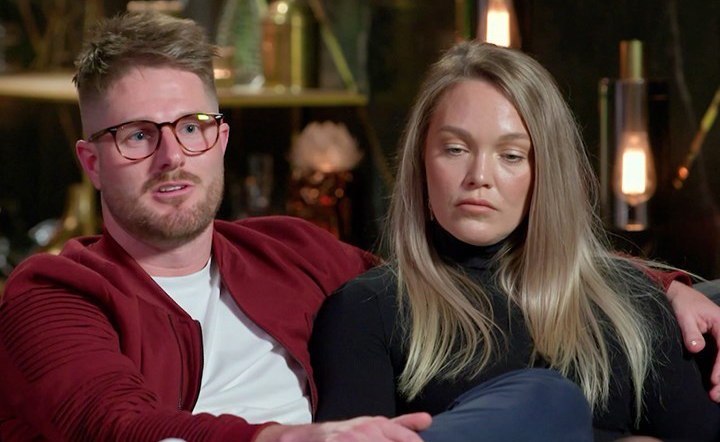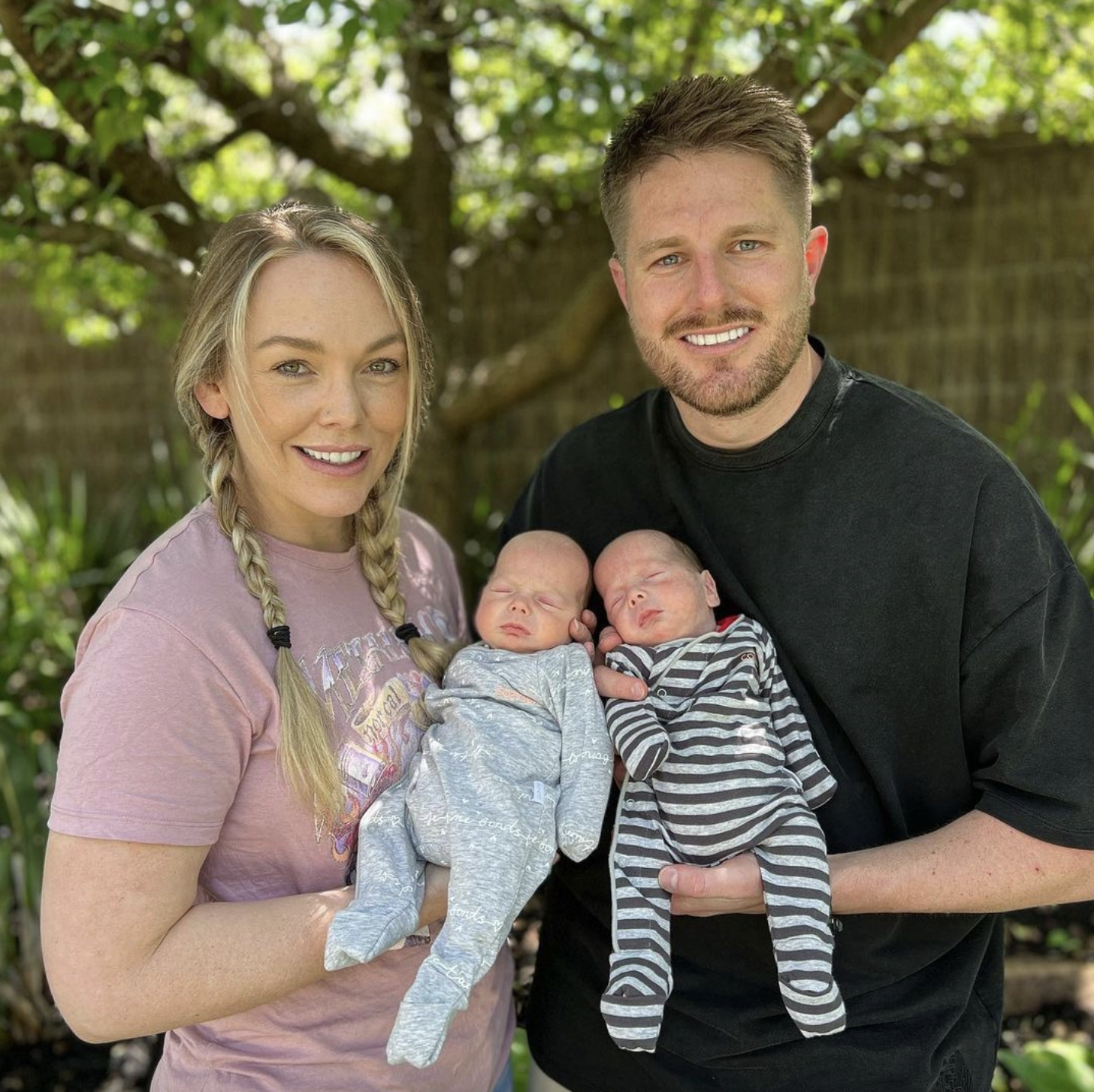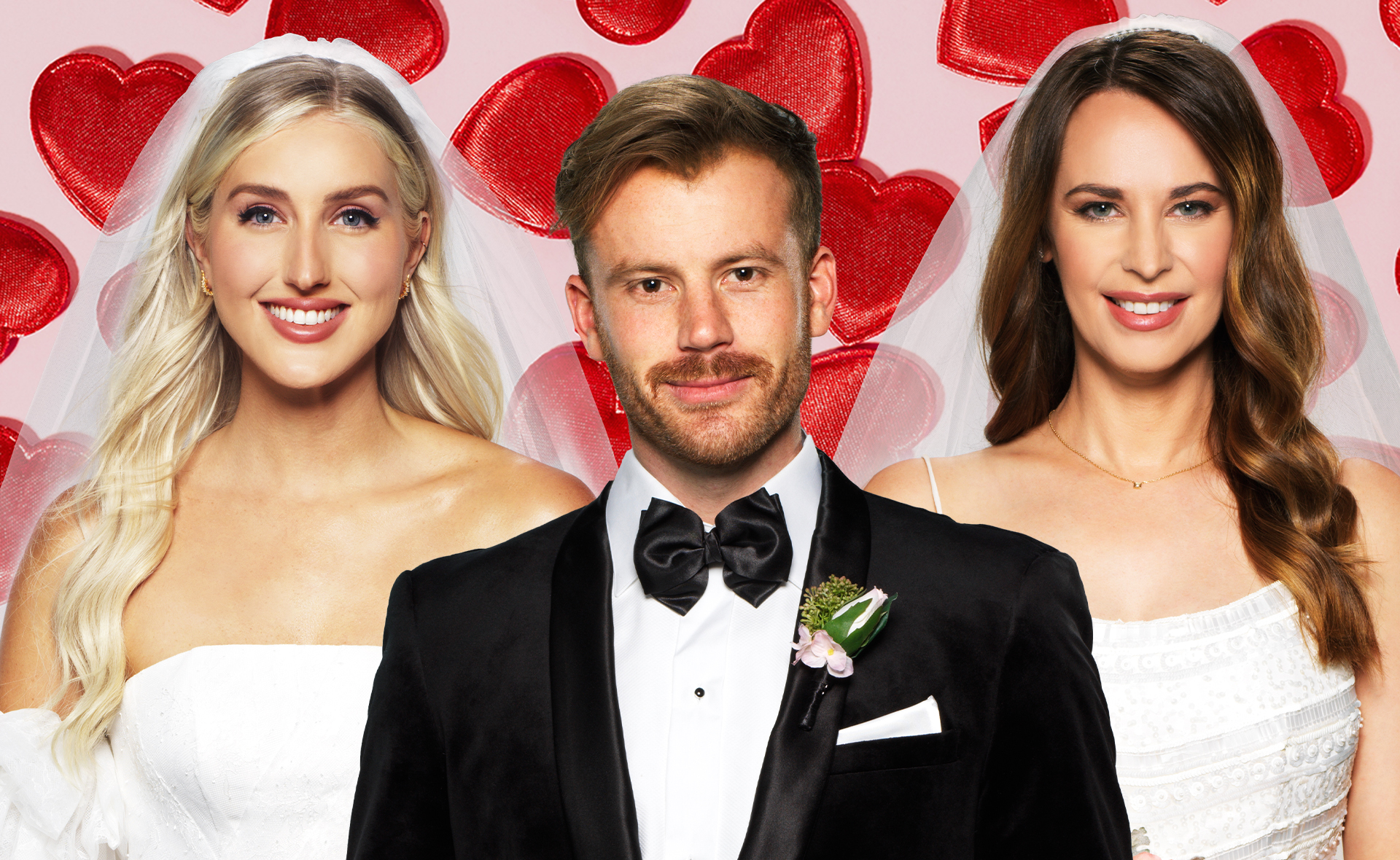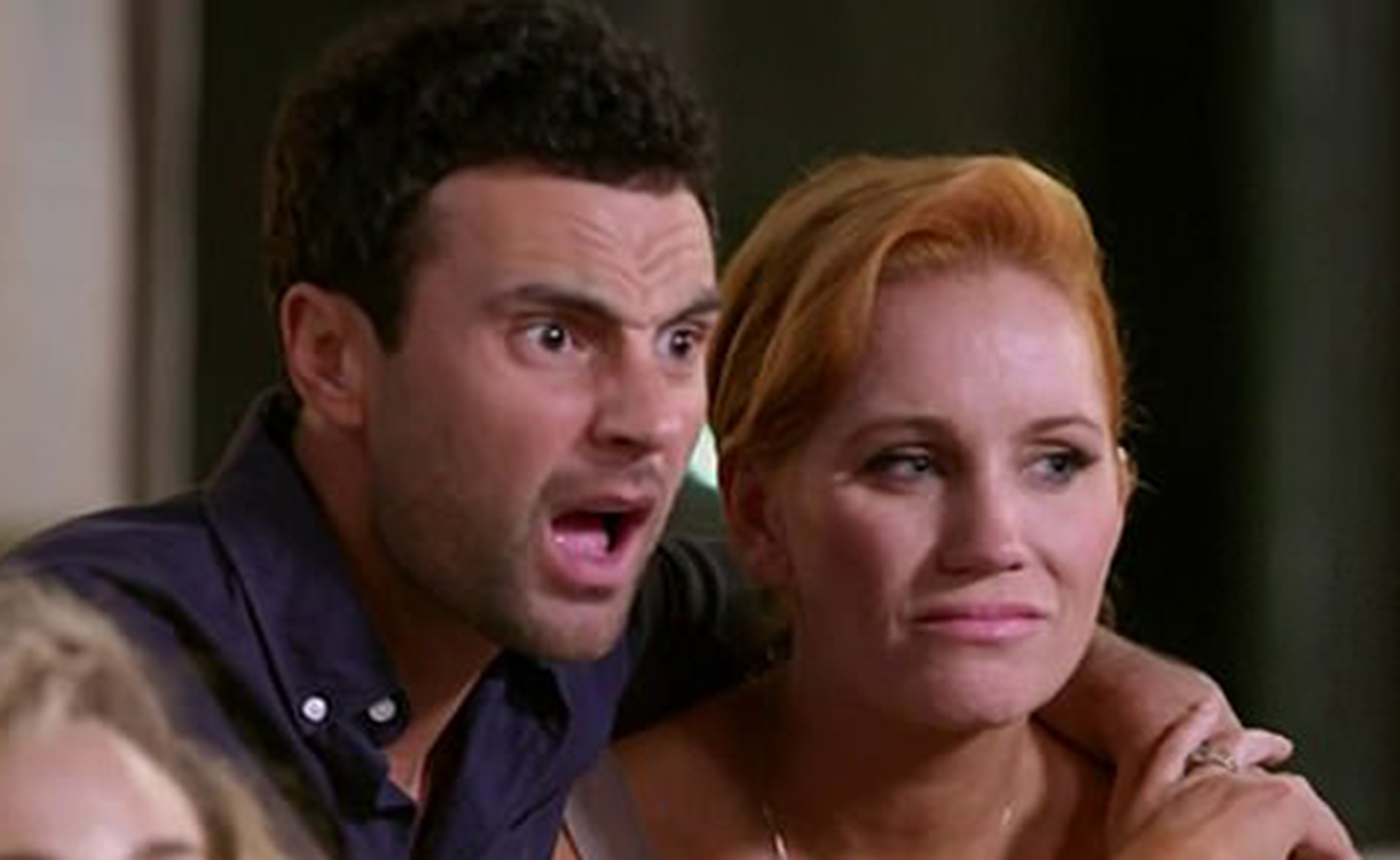To some, Married At First Sight may be known as nothing more than a trashy reality show that viewers take with a grain of salt when watching.
But in recent seasons, we’ve learnt that the controversial experiment is actually able to educate us about toxic relationships, gaslighting, manipulation and emotional abuse.
Thankfully, gone are the days of society believing that the only type of domestic violence a person can suffer is physical. But without the presence of bruises, black eyes and cuts, other more complex types of abuse can be harder to not only pinpoint, but to navigate through.
Since MAFS‘ inception back in 2015, we’ve witnessed brides berating and demeaning their grooms for showing too much emotion, only further contributing to toxic masculinity.

Season eight groom Bryce Ruthven was accused of “gaslighting” Melissa Rawson.
(Image: Nine)We’ve seen David Cannon rub his cheating wife Hayley Vernon’s tooth in a toilet bowl, Jessika Power engage in a full-blown affair with Dan Webb, and more recently, Carolina Santos tell Dion Giannarelli that women are only interested in him for his money.
But without a doubt, the biggest scandal to plague the experiment has been Bryce Ruthven’s treatment of his now-fiancée Melissa Rawson.
The backlash was so bad that the Australian Communications and Media Authority even conducted an investigation into his alleged “gaslighting” behaviour.
Despite thousands of complaints to the watch dog, the show was eventually cleared of breaching the Commercial Television Code of Practice.
Melissa, who now shares twins Levi and Tate with her MAFS groom, denied claims she was gaslit by Bryce, saying: “I know the real Bryce, what everyone is seeing is a great edit – I’ll say that,” while Bryce himself also shut down the allegations.

“I know the real Bryce, what everyone is seeing is a great edit – I’ll say that.”
(Image: Instagram)In a statement to Now To Love, Channel Nine and Endemol Shine said it takes the wellbeing of MAFS participants “extremely seriously”.
“All participants have access to the show psychologist during filming, during broadcast and once the program has ended. Nine also have an additional service for participants should they like or need further individual and confidential psychological support,” the statement read.
While MAFS, at its core, is simply a reality TV show designed purely for entertainment purposes, the affects and intricacies of toxic relationships being played out on our screens can’t be ignored.
Certified Australian life and relationship coach Megan Luscombe tells Now To Love that MAFS is both equal parts harmful and helpful.
“It’s helpful because there will be viewers who identify with the displayed toxic behaviour and as a result seek therapy or personal development to become better versions of themselves,” she tells us.
“On the other hand, seeing this behaviour normalised on screen then trivialises the seriousness of such negative actions. The “experts” also don’t spend nearly enough time unpacking the individual within the couple, calling out their red flag like behaviour for what it really is.”
Tell-tale signs you may be in an emotionally abusive relationship
The first step in getting out of an emotionally abusive relationship is recognising that you’re in one. Megan says these red flags often begin with small, everyday behaviours.
“Your partner is controlling: If your day-to-day routine is being put under the microscope or policed by your partner, that’s a sure fire sign of control,” she says.
“If they take away opportunities for you to be independent, that’s control. If they seek to make all of your plans, that’s control.”
In recent years, “gaslighting” has become somewhat of a buzzword, but the seriousness of its true effects on a person can’t be taken lightly or underestimated.
“If you’re starting to question your memories of events that have taken place with your partner because they’re constantly telling you you’re wrong or ‘imagining things’, it’s a sign of gaslighting,” Megan says.
“If you’re being dismissed as ‘crazy’ and ‘overreacting’ there’s a high chance you’re being gaslit.”
Isolation adds another layer of complexity to the broad topic of emotional abuse, and can easily be hidden in plain sight.
“If your partner never wants you to go out or stops you going out, doesn’t want you to see your friends/family and starts telling you that your social network is bad for you (without legitimate reason), and that you should stop seeing them, this can be a sign of your partner isolating you,” Megan says.
How to know when red flags are traits that a partner won’t change

“If you’re being dismissed as ‘crazy’ and ‘overreacting’ there’s a high chance you’re being gaslit.”
(Image: Pexels)Knowing the difference between problematic behaviours that can easily be changed, and realising when it’s time to get out of a relationship immediately can often be confusing.
But Megan assures that with the right tools, you’ll be able to determine when it’s necessary to walk away, or if there’s still hope for your relationship.
“When the person giving off red flag type behaviour takes accountability for their actions, recognises the wrong, and seeks professional help to overcome their wrongdoing, then you should feel comfortable that as a couple you might be able to move forward,” she says.
“If such actions aren’t acknowledged by the individual, swept under the rug, or start to build a sense of resentment, you should most definitely think about separating yourself from them, before the relationship turns toxic.”
How to talk to your partner about problematic behaviour
If, after careful consideration of the above examples, you believe the problems in your relationship can be worked out amicably and without further distress, Megan suggests addressing your concerns in a “calm environment”.
“As the conversation progresses you want to ensure they aren’t using accusatory language like ‘you’re the reason this is happening’ or turn to blaming, saying ‘if you didn’t do this I wouldn’t be sad’,” she says.
Instead, Megan suggests saying something along the lines of: “When you speak down to me it demonstrates you don’t value my thoughts or opinion and place yourself higher than me, this behaviour is a problem for me and is something I’d like us to talk about so it can be worked on together.”

Non-monogamy is a structure that allows for couples to participate in other relationships or sexual adventures.
(Image: Pexels)What is ethical non-monogamy?
Non-monogamy is a relationship structure that allows for couples to participate in other relationships or sexual adventures outside of the primary relationship.
Some couples agree to use dating apps to seek out new connections while others might allow encounters to occur more spontaneously, for example, on a night out of drinking.
Former Bachelor star Abbie Chatfield recently revealed she and boyfriend Konrad Bien-Stephen are in an “open relationship”, which shocked some fans but opened up a healthy dialogue around the previously-taboo topic.
“What women need to know is that non-monogamy is a relationship structure that requires consent from both parties in the relationship, it also requires a high level of trust and communication,” Megan says.
“If you find yourself becoming jealous easily or battling with insecurities, I recommend turning to a professional relationship coach for guidance and support so you can continue to navigate the relationship in a positive way.”

Abbie Chatfield recently revealed she and boyfriend Konrad Bien-Stephen are in an “open relationship”.
(Image: Instagram)Why dry dating is trending and what it means for your first date
These days, plenty of singles are putting the booze away in substitute for non-alcoholic options which is fantastic for people’s health and mental clarity while on a date.
But on the other hand, it means that some people can no longer rely on “liquid courage” anymore.
“For first dates especially, this might leave people feeling nervous and vulnerable. If you’re biding time between meeting face to face, or looking to know a little more about each other before hitting the town, try jumping on Hello Tiger,” Megan tells us.
“Their video feature is the perfect buffer – you can feel confident in who you’re meeting in real life having chatted to them online and gotten the awkward introduction and ice breakers out of the way.”
What are some relationship “green flags” we can keep an eye out for
It’s not all doom and gloom! While being aware of toxic traits in your relationship, it’s also imperative to focus on the green flags your partner is giving you.
“A person who is able to confidently communicate their feelings, wants and needs, is someone you can build a positive connection with from the get-go,” Megan says.

One in 16 men have experienced physical or sexual violence at the hands of a current or previous partner.
(Image: Pexels)What are signs a man is being emotionally abused by a woman?
Domestic violence goes both ways, but there’s a harmful stigma that still exists in society where people often don’t see women as perpetrators of abuse.
According to the Australian Bureau of Statistics, one in 16 men have experienced physical or sexual violence at the hands of a current or previous partner.
Megan says emotional abuse at the hands of a woman could be as simple as the man “frequently or obsessively” having to check in with his partner to let her know where he is and who he is with.
“This can very well be because his partner is using her insecurities to control him. If she puts him down in front of his friends or family, this is another common sign,” she says.
“Making harsh or belittling statements like “if only you were as active as your friends, maybe then we’d have more sex”, “pity you’re not as smart as your dad, then you’d make more money for our family”.”


